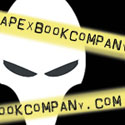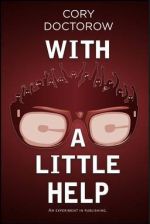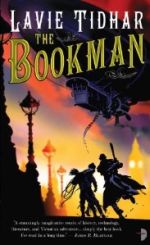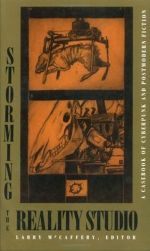Is SciFi good Kindling?
E-books and the future of science fiction
Once again, don’t be fooled by the title. I’m not about to go all Fahrenheit 451 here. But the brand name of my e-reader does, ironically, evoke haunting images of Bradbury’s rising flames. “There’s a reason it’s called Kindle,” novelist Will Thomas noted at a panel discussion on “E-Books, Kindles, & Nooks” this past April. Indeed, one of the default screen savers on my Kindle gives a dictionary entry for the word; ominously, the first definition listed is “Light or set fire.”
There are many e-readers to choose from, of course. I love my birthday Kindle, but I’ll be one of the first to admit that other offerings out there also serve the purpose fairly well. I’ve browsed and read and played on Nooks, Sony Readers, and iPads — even on cell phones. (And of course, before all these new-fangled gadgets appeared there was always the “old-fashioned” computer screen, on which I’ve done my fair share of book-reading, too.) Some of these gizmos may have extra bells and whistles, more user-friendly web access, longer battery life, fewer format restrictions, or perhaps a larger library (though that word misleadingly implies borrowing rather than buying), but if all you want to do is read books, one platform is just about as good as another. I don’t propose to write a consumer report here. What I do want to explore is how the growing popularity of e-readers and e-books (of any brand) has the potential to transform society in general, and scifi in particular.
What I found surprising in the afore-mentioned discussion was that all three of the author panelists (the other two were Steven Wedel and Lou Antonelli) were rather neo-Luddite in their views of how e-readers would affect the industry. Antonelli fretted about the decline of professional standards now that “anybody can be a publisher,” Wedel voiced worries about piracy, complaining, “My story is all over the web now. Most of the time my name is still on it.” And Thomas predicted (somewhat tongue-in-cheek) that e-books would precipitate the “end of civilization as we know it” by the year 2045 (with the last edition of Shakespeare and Stephen King). Here were three authors who make their living applying their creative imaginations to questions of how technology might alter society, and all of them were lamenting the rise of the e-book and prophecying gloom and doom for writers and readers alike. Should we be worried?
Like author Eric Flint, the “First Librarian” at Baen’s Free Library, I’m not convinced that professional standards and piracy are very serious issues. As far as professional standards go, Flint argues that editors and publishers are not simply middlemen with whom we may dispense, but that they in truth serve an essential function as gatekeepers. He explains, “[I]f someone actually managed to ‘liberate’ publishing and publish every piece of fiction being written immediately on the internet … a demand would be instantly created for some kind of company which provided the public with the ABSOLUTELY ESSENTIAL service of hacking through all the weeds to find the stuff worth reading” (Prime Palaver #2). In other words, if we got rid of all the publishers, we’d have to create them all over again.
And as far as the other worry, piracy, goes, Flint also provides hard data that the availability of free e-books actually increases an author’s sales (Prime Palaver #6) by exposing more readers to the author’s writing who might not otherwise have bothered to sample it, and who then go on to purchase copies of the author’s other books. National Academy Press also reported record book sales after making all of their books available for free online (Jensen). Those facts paradoxically paint pirates as publishers’ pals. And as numerous scifi fans pointed out at the Conestoga panel, the digital rights management strategies which many e-book publishers enforce actually turn off readers, who generally seem to want more user-friendly and flexible formats. Ironically, if publishers would just quit worrying about people stealing their e-books, they might actually sell more. So both of the specific worries expressed by the panelists, piracy and professional standards, seem to be ill-founded.
























5 comments
[…] Is SciFi Good Kindling? by Henry […]
This is a weird thing which seems to affect a lot of sci-fi writers (in my experience, anyway), both in their view of the future of publishing, and also in their adoption of new technologies. As a sci-fi fan and aspiring writer, I can’t imagine not adopting the newest, coolest gadgets as they come out — I get to live the stuff I read about growing up!
[…] This post was mentioned on Twitter by Mr Spock. Mr Spock said: Is SciFi good Kindling?E-books and the future of science fiction … http://bit.ly/agxnlg […]
Henry,
I appreciate the nod in your essay, but I have to jump in and correct a possible misinterpretation of the information. I use my Kindle both for e-books and Audible files. Sadly, the fear of the new publishing paradigms made possible by e-readers has over-ridden the goodness that would be more universally accessible reading for people whose bodies function in ways that limit their ability to read directly from a text object. (This is not just an issue for the visually impaired; many people with mobility and motor function issues also find books problematic.) When Amazon introduced the text-to-speech function, the writing community was disquieted. This essay by Roy Blount, Jr. is probably the most erudite version of the argument against this feature: http://www.nytimes.com/2009/02/25/opinion/25blount.html
Now, as a writer, I do care about rights and about the already paltry revenues that most writers see from their efforts. That said, I care more about accessibility. Amazon has seriously crippled the function, allowing publishers to “opt out” (which most have done) and seriously limiting the liberatory potential of the Kindle for persons with disabilities.
I have played with Kindle’s text-to-speech tool, and frankly, though it’s cool, it doesn’t strike me as a serious threat to the audio-book market. The voice can’t inflect, it can’t provide subtle clues to character shifts in dialog, and it rise and fall in tempo and pitch along with plot points.
It’s my sad belief that, in this case, the Author’s Guild came out on the wrong side of an issue that matters deeply to persons with a variety of disabilities. I hope that it’s a short-lived mistake, and that we see text-to-speech capabilities built into all e-readers in the near future.
Sarah
[…] or with their wonderful essay on eReaders at “Is SciFi good Kindling?” by Henry Cribbs […]